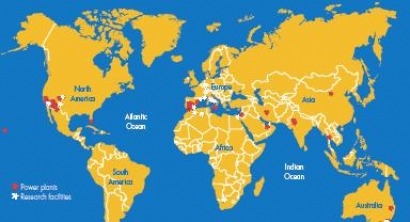
ESTELA’s Third Solar Thermal Electricity Industry Forum in Cologne (Germany) took place last week, gathering all main industry and research actors and specialised media. The event confirmed the sector’s progress around the world in spite of the impact of the global economic crisis.
“[The] huge potential and specific STE technology advantages, such as conversion efficiency, great dispatchability and good results in operating plants, are the key of success of Solar Thermal Electricity power plants;” said ESTELA in a press statement after the event.
Welcomed by Mrs. Svenja Schulze, State Minister of Innovation Science and Research of North Rhine-Westphalia and President of ESTELA, Dr. Luis Crespo, representatives from the Federal Ministry for the Environment, Nature Conservation and Nuclear Safety of Germany (BMU), European Commission, European Investment Bank (EIB), International Energy Agency (IEA) and International Renewable Energy Agency (IRENA), grid operators such as REE and TERNA as well as representatives of Research Institutions and organisations met in Cologne to analyse the current challenges in Europe concerning the electrical interconnections for a secure and renewable energy system, on the financing new capacities and on the new priorities on the field of research and innovation for 2014-2020.
The latter point opened a debate on how to create a win-win relationship between public and private sector and also between research institutions and industry.
The Forum was also the opportunity to analyse the current situation of the solar thermal electricity sector in Europe, concentrating the debate on which policies and driving forces are to develop the sector together with financial aspect and macro-economic impact such as job creation, winning characteristics that contribute to the deployment of solar thermal electricity in the countries of the World’s Sun Belt.
“At the core of the expansion of the sector in Europe are the completion of the internal market of electricity and the extension and improvement of the grid infrastructures. Priority grid European corridors should be designed and financed in the coming 10 years to step forward a full electricity market with high capacity for renewable dispatchable electricity,” explains ESTELA.
Finally, to maintain the leadership of European industry ESTELA says that research and innovation will be carried out on a partnership research institutions/industry. “Cooperation between research institutions at European level is also of paramount importance and should be supported in the programme 2014-2020.”
Those attending the Forum also expressed their great concern on the recent moratorium from the Spanish government on schemes supporting renewables. “These measures could undermine the leading position of the European industry in a moment where solar thermal electricity is experiencing its take-off at world-level,” warned ESTELA.
ESTELA has called for this suspension of subsidies to be as short as possible and for a clear definition of the trajectory of solar thermal electricitycapacity in Spain by 2020.
According to a study published by Protermosolar (Spain's solar thermal electricity industry association) in 2010 alone, with the plants in operation and under construction, the sector created around 24,000 employees and contributed €1.6 billion to Spain’s GDP.
Lastly, the Forum also celebrated the awarding to a European company of the first two solar thermal electricity plants in South Africa in the framework of the REFIT and the progress in the development of projects in United States, India, Morocco and Australia.
ESTELA recently published its five-year report, which is available here.
For additional information:


